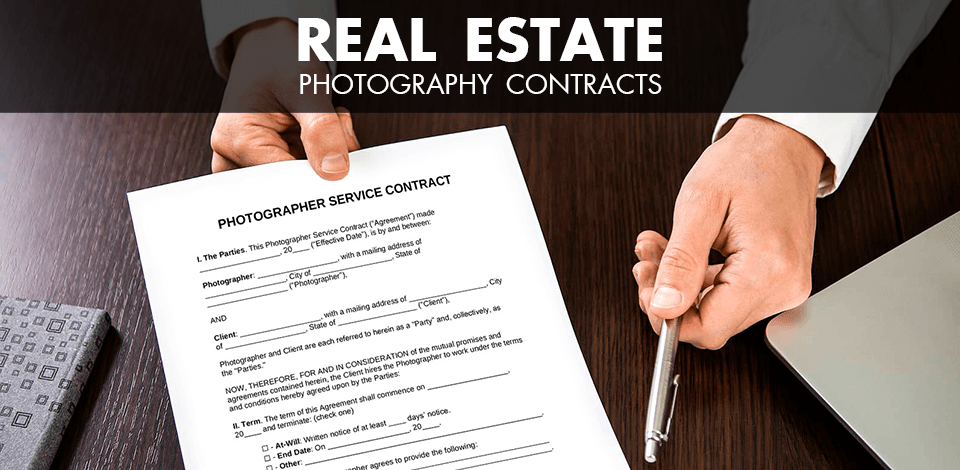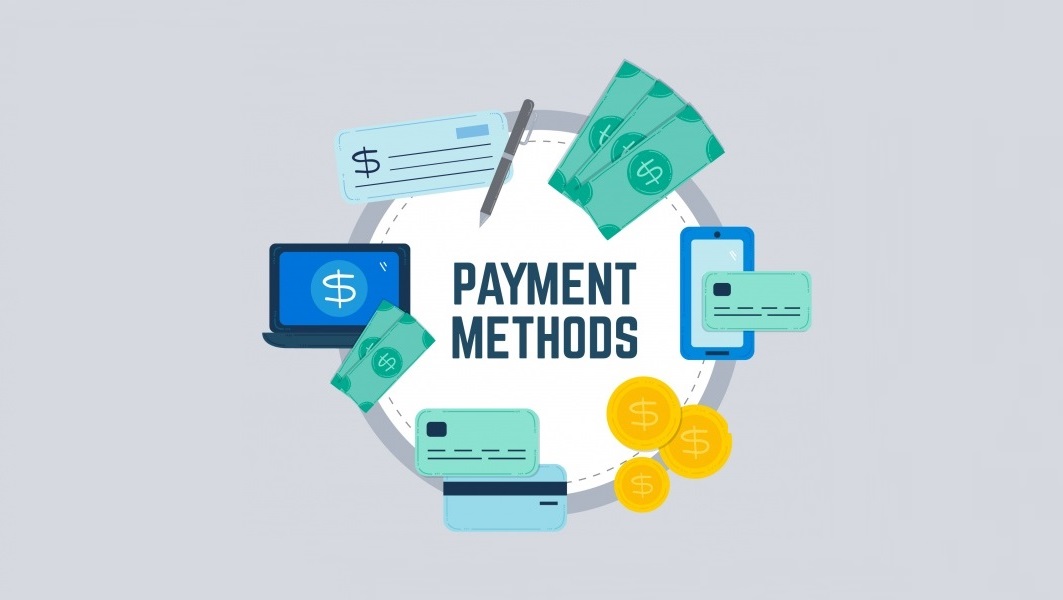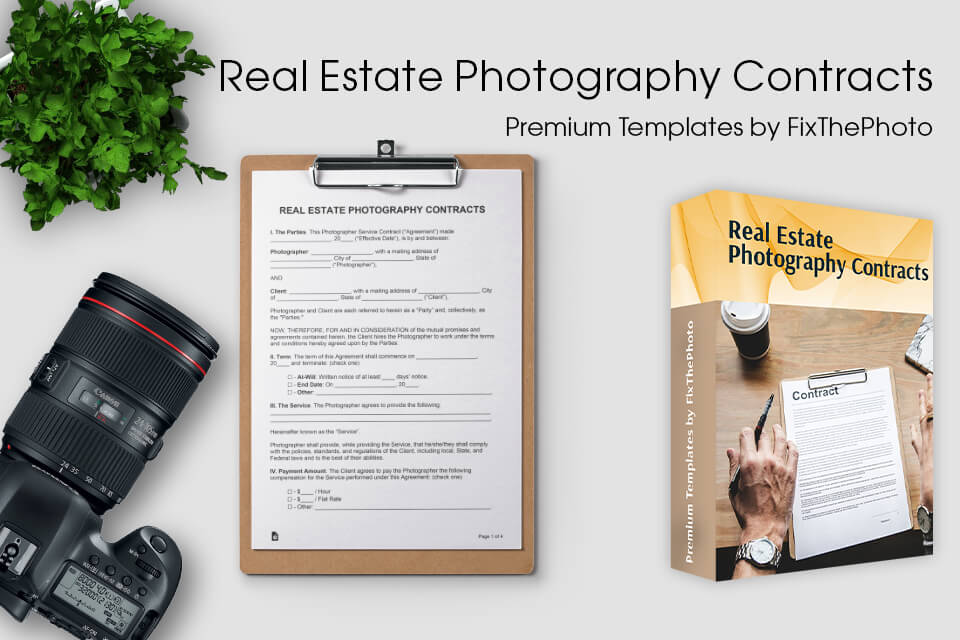
A real estate photography contract is a written agreement between a photographer and a client concerning photography services, with the obligations of both parties, the terms of payment, as the rights to use finished images clearly defined.
With a proper contract, you can be sure you’ll get paid for your work without delays. Besides, such a document allows setting boundaries of a project, protecting your photos, and working in accordance with clients’ expectations.
Being a real estate photographer for 10 years, I’ve made the samples of all contracts which can be useful for beginners. Everybody can download them free and use to protect your work.
At first glance, drawing up a contract may seem like a needless and too complicated task especially if you just plan to get into real estate photography. However, this agreement is obligatory and offers benefits both for a photographer and a client, preventing possible conflicts and misunderstandings.

When a person approaches you for particular services, he/she wants to learn as much as possible about you as a professional to understand what “product” he/she will get in the end. So, the first portion of information a contract must have included:
Your client also has to provide such details. Make sure to write a correct date and, if you want, include the place where you have signed a contract (city, state).
This section allows for many alterations, as there is no one-size-fits-all solution for real estate photography projects. Much depends on client’s demands and the ideas you will bring to life. Here you need to describe a project as thoroughly as possible, highlighting its peculiar features. It is necessary to write the address of the property you will photograph, major areas you need to capture, the scheduled date of the shooting and project delivery.
If your photoshoot will consist of several stages, you need to name them all – staging, 3D real estate photography, real estate aerial photography, etc.
Not only the shooting process, but also image editing requires defining timeframes. State how many images and in what format you’ll send to your client, how many hours you will spend improving photos, in what way you’ll deliver files (USB, email, temporary cloud storage link), agree on the rounds of feedback or hours of effort.
If any of the parties has some specific requirements, it is necessary to include them in a contract. For instance, a client may want to get not only edited photos but also original shots, and you, as a photographer, may want to include these images into your photography portfolio.

Many conflicts arise when it comes to a financial part, so it is very important to clarify all points in a legal way. Primarily, define how and when you will get money for your services. A client can pay for real estate photography jobs in cash after/before the shooting or using online payment systems and transfer money in advance.
Sometimes, photographers get paid upon delivering images. If a client doesn’t pay within 30 days, his/her rights granted by a contract become instantly void.
It is also a nice idea to ask for a deposit before the shooting. You can agree on the amount or use a general standard of 25-50% of the total cost. Make sure to write in a contract that you’ll send edited photos after payment confirmation, which is typically carried out within 12-24 hours.

A separate paragraph of a real estate photography contract should be devoted to a preparatory stage. This usually refers to how and who will prepare the property before and during the shooting. For instance, you need to describe in detail whether a photographer has to take care of decorations and lighting or whether there will be another specialist responsible for the task.
This is extremely important for commercial real estate photography and high end real estate photography.
If there are several people responsible for a photoshoot, a contract must include information about the responsibilities of all contractors and the way they are expected to cooperate in order to achieve a successful result. As a photographer, you should also inquire whether you will get compensation if any of the contractors do something wrong and the shooting will be rescheduled.
Though we all have a settled plan to work by, usually there appear unexpected situations that call for changes. Not to stay protected if something is out of your control, I highly recommend including the cancelation point in your contract. To play it safe, you should define the penalty amounts if a client cancels a contract before a project is completed.
It makes sense to specify the details of project cancelation and you can find a proper real estate contract sample for every case. This can be cancelation during the shooting or when you get down to photo editing. Both stages are time-consuming, so you need to choose a cancelation penalty that can cover time and effort.
You should also state how much a client has to pay if he/she changes the time of the shooting or wants to get edited images faster than agreed.
If you offer only photography services and delegate the task of photo processing to a professional company, you need to state this clearly in the agreement. Our experienced retouchers have become image editing partners for many photographers all over the globe. It takes us only several days to improve real estate photos according to industry standards.
A contact must have a separate section with the following info:

For some reason, clients think that they own photos they pay for. However, since a photographer provides digital copies of images, he/she remains the sole owner of the files, while a client only purchases the license to use them.
A serious case of photography copyright infringement is sharing photos with real estate agents and third parties without a photographer’s permission. That’s why, you need to include this point in a contract and define how and where a client can use images.
Generally, clients can share images on the net without time limits. However, sharing photo copyrights or using photos in advertising is forbidden.
Professional photo session often involves additional expenses and you need to warn a client about them in advance. Such expenses can be added to a final real estate photography salary if both parties agree to it. An additional fee is calculated if a client suddenly wants more images during the shooting, is interesting in non-standard photo editing operations, or needs pictures in a printed format. Travel expenses are also added to the sum.

Regardless of what real estate photography contract template you choose, there will be some space at the end where you need to put signatures and write the date. This section specifies the parties involved, states that no other agreements were made, and defines the sum a client has to pay and the number of changes that can be made to a project.
Starting a photography business, you definitely expect to get income. In order to make your activity profitable and the work stress-free, you need to draw up a contract.
Though there are photo sessions that are carried out without preliminarily written contracts, you’d better sign one in order to protect your and your clients’ right. There are also some other reasons that may persuade you to have a written agreement.

A photographer can feel at ease if all terms of cooperation are legally determined. Sometimes clients think that paying a bit later for the services isn’t a big deal, but they will change their mind if they have to pay a penalty fee for being overdue.
A well-written real estate photography contrast does wonders when it comes to resolving all sorts of issues that appear between a photographer and a client. Actually, there is nothing to argue about if every step of the working process is described in advance.
It happens quite often that photographers need to pay for transport or petrol to get to the destination. They also buy additional real estate photography equipment in the process of shooting. While drafting a contract, you need to have a special paragraph for additional expenses, maintenance costs for handling a camera for real estate photography and a drone for real estate photography.
Besides, if a client suddenly wants you to take 1000 photos instead of the agreed 800, you can charge extra. Just make sure to write about this in a contract.

In the era when all serious business projects are carried out on the basis of a previously signed contract, you will look really amateurish and unreliable if you suggest your client discuss all the details verbally and then immediately get down to work. This approach doesn’t work anymore. Clients like working with trustworthy real estate photographers and drawing up a contract adds to your professional image.
Another advantage of signing a contract is that your copyrights are protected by law. Thus, no one will use your images without your permission and without mentioning your authorship.
It doesn’t matter whether you take photos for an individual client or a large corporation – they can use your images in accordance with the terms indicated in a contract.

Download and use these free real estate photography contract templates that include all the points I described above. They have terms of employment, responsibilities of both parties, compensation procedure, and more.


